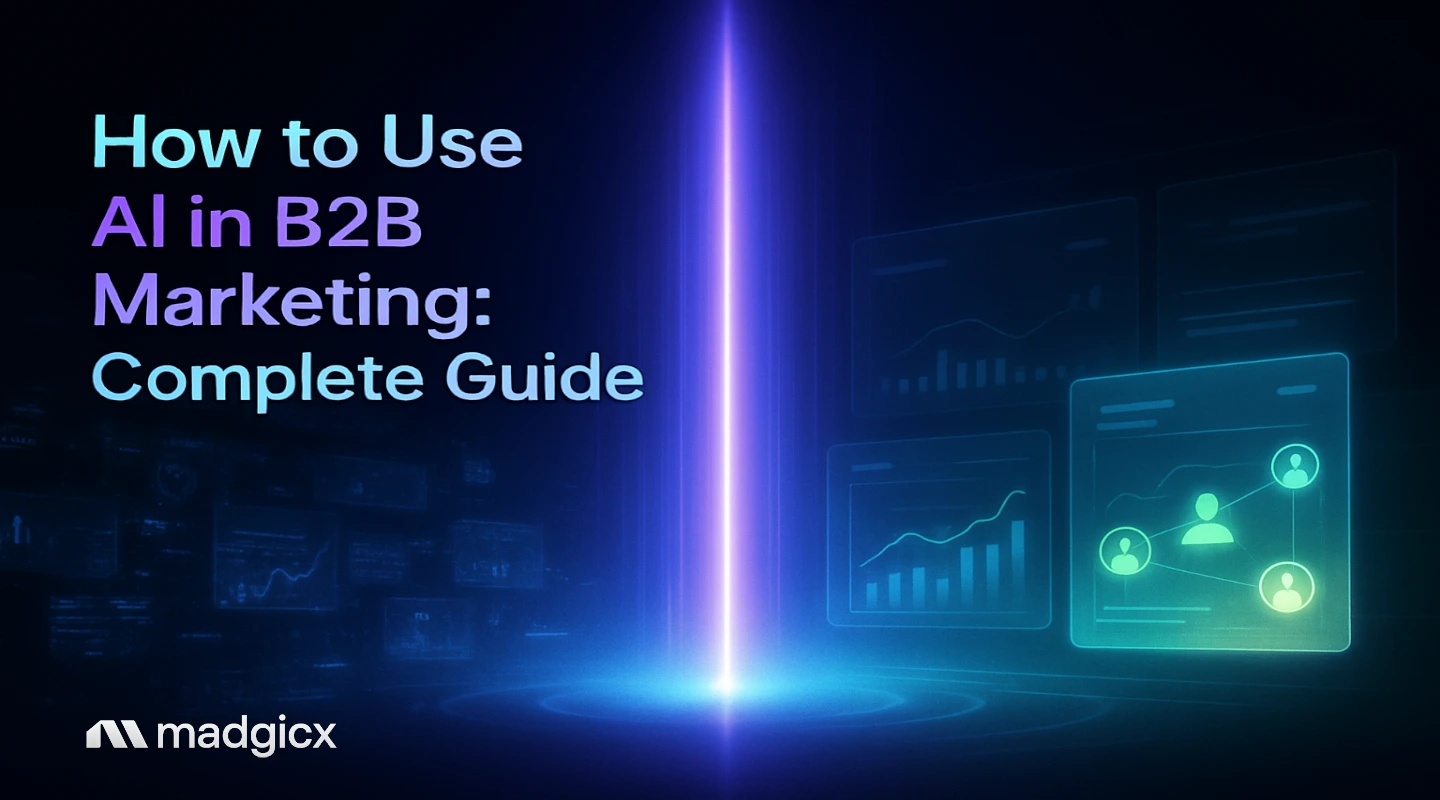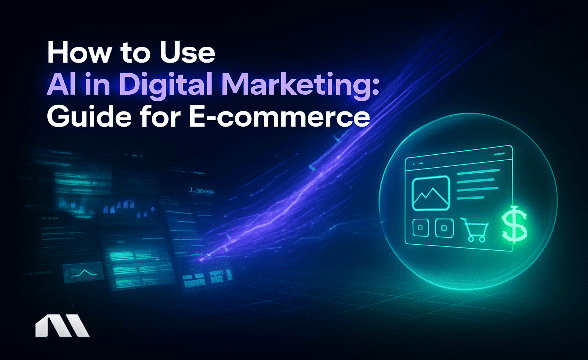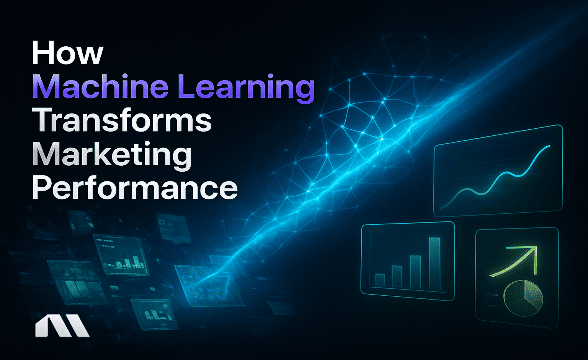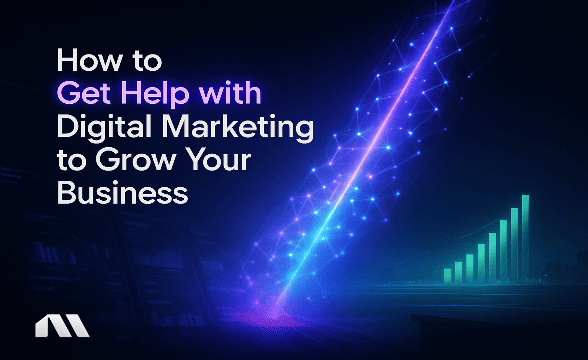Learn how to implement AI in B2B marketing with proven strategies, ROI data, and step-by-step frameworks. Reduce acquisition costs with AI automation.
Picture this: Six months ago, Marcus was pulling 60-hour weeks managing his B2B software company's marketing campaigns. Between manual bid adjustments, audience segmentation, and trying to keep up with lead scoring, he was burning out fast. His team was spending more time on spreadsheets than strategy, and their customer acquisition costs kept climbing.
Fast forward to today, and Marcus's AI-powered marketing system handles the optimization heavy lifting while delivering 30% better acquisition costs. His team now focuses on high-level strategy while AI handles the data crunching, provides smart recommendations, and keeps campaigns running smoothly.
B2B AI marketing refers to using artificial intelligence technologies to automate, optimize, and personalize marketing processes including lead generation, content creation, predictive analytics, campaign management, and customer journey optimization. Rather than replacing human marketers, AI amplifies our capabilities by handling data-intensive tasks and providing insights that would be impossible to generate manually.
This complete guide shows you exactly how to implement B2B AI marketing in your strategy. You'll get proven frameworks, real ROI data, and step-by-step processes that performance marketers are using to stay competitive in 2025.
What You'll Learn in This B2B AI Marketing Guide
Here's exactly what we're covering to get you from AI-curious to AI-powered:
- Complete audit framework to identify your biggest AI opportunities (with downloadable checklist)
- 7 proven AI applications that deliver measurable ROI in B2B marketing
- Step-by-step implementation roadmap with realistic timelines and budget considerations
- ROI calculation templates and performance benchmarks from 2025 data
- Common pitfall solutions that save months of trial and error
The Current State of B2B AI Marketing (2025 Reality Check)
Let's cut through the AI hype and look at what's actually happening in B2B AI marketing right now.
The numbers tell a compelling story: 89% of leading businesses are already investing in AI marketing technologies, and 62% of marketers plan to adopt AI marketing tools within the next two years. This isn't future planning anymore – it's current competitive reality.
But here's where it gets interesting for performance marketers: while adoption is widespread, implementation quality varies dramatically. 63% of businesses admit they lack the internal expertise to effectively implement AI marketing strategies. This creates a massive opportunity for marketers who get B2B AI marketing implementation right.
Current B2B AI marketing applications include:
- Predictive lead scoring using behavioral data and firmographic information
- Dynamic content personalization across email, web, and advertising channels
- AI-assisted campaign optimization for paid advertising platforms
- Customer journey mapping with AI-powered attribution modeling
- Sales funnel automation with intelligent lead routing and nurturing
- Performance analytics with AI-driven insights and recommendations
The key difference between successful and struggling AI implementations? Strategic focus over tool accumulation. The most successful B2B marketers start with specific use cases that solve real problems, rather than trying to implement AI everywhere at once.
Pro Tip: Start by identifying your three most time-consuming manual marketing tasks. These are usually your best candidates for AI automation and will deliver the fastest ROI.
How AI Is Actually Used in B2B Marketing (7 Proven Applications)
Now let's dive into the specific ways performance marketers are using B2B AI marketing to drive measurable results. These aren't theoretical applications – they're proven strategies with real ROI data.
1. AI-Powered Lead Generation and Qualification
AI transforms lead generation from spray-and-pray to surgical precision. Instead of casting wide nets and hoping for the best, AI analyzes thousands of data points to identify prospects most likely to convert.
How it works: AI algorithms analyze your existing customer data to identify patterns in demographics, behavior, and engagement. Then they score new leads based on similarity to your best customers, automatically routing high-value prospects to sales while nurturing others through marketing automation.
Real impact: Companies using AI lead scoring typically see 31% improvement in conversion rates compared to traditional methods.
2. Predictive Analytics and Customer Scoring
This goes beyond basic lead scoring to predict customer lifetime value, churn probability, and optimal engagement timing. AI analyzes historical data to forecast future behavior with remarkable accuracy.
Practical application: Your AI system identifies that enterprise prospects who engage with pricing content within 48 hours of downloading a whitepaper are 340% more likely to request a demo. This insight automatically triggers personalized pricing discussions for qualified leads.
3. Content Personalization at Scale
AI enables true one-to-one personalization without the manual overhead. Instead of creating separate campaigns for each segment, AI dynamically adjusts content, messaging, and offers based on individual prospect behavior.
Implementation example: Your website automatically adjusts headlines, case studies, and CTAs based on visitor industry, company size, and previous engagement history. Email campaigns personalize subject lines, content blocks, and send times for each recipient.
4. Campaign Optimization and Automated Bidding
This is where B2B AI marketing really shines for performance marketers. AI-powered platforms continuously optimize campaigns and automate bidding to maximize ROI across all your advertising channels.
Real-world results: Automated bidding and optimization typically deliver up to 30% reduction in customer acquisition costs while maintaining or improving conversion volume.
For B2B advertisers, platforms like Madgicx take this further by providing 24/7 campaign monitoring and optimization recommendations specifically designed for complex B2B sales cycles and attribution challenges. Try our AI for free here.
5. Customer Journey Mapping and Attribution
AI creates detailed maps of how prospects move through your funnel, identifying bottlenecks and optimization opportunities that human analysis might miss.
Key benefit: Instead of guessing why prospects drop off, AI pinpoints exactly where and why, enabling targeted interventions that improve conversion rates.
6. Sales Funnel Automation
AI orchestrates complex nurturing sequences that adapt based on prospect behavior, ensuring the right message reaches the right person at the optimal moment.
Advanced application: When a prospect visits your pricing page but doesn't convert, AI might trigger a personalized video from your sales team, schedule a retargeting campaign with social proof content, and alert your sales rep to follow up within 24 hours.
7. Performance Attribution and Analytics
AI solves the attribution puzzle that plagues B2B marketers by analyzing multiple touchpoints across long sales cycles to determine true campaign impact.
Why this matters: B2B sales cycles often span months with dozens of touchpoints. AI attribution models provide accurate ROI data for each marketing channel, enabling smarter budget allocation decisions.
Pro Tip: Focus on implementing 2-3 of these B2B AI marketing applications well rather than trying to do everything at once. Master the basics before moving to advanced applications.
The Real ROI of B2B AI Marketing (Data-Driven Analysis)
Here's what performance marketers really want to know: what's the actual return on B2B AI marketing investments?
The data is compelling. Companies implementing B2B AI marketing strategies report:
- Up to 30% reduction in customer acquisition cost through improved targeting and optimization
- Up to 30% improvement in conversion rates via lead scoring
- Up to 25% boost in customer satisfaction through personalized experiences
But here's the reality check: these results don't happen overnight. Most companies see initial improvements within 3-6 months, with full ROI realization taking 12-18 months.
ROI Calculation Framework for B2B AI Marketing
To measure your B2B AI marketing ROI accurately, track these key metrics:
- Customer Acquisition Cost (CAC) reduction - Compare pre and post-AI implementation
- Lead quality improvement - Measure lead-to-customer conversion rates
- Time savings - Calculate hours saved on manual tasks
- Revenue attribution - Track revenue directly attributable to AI-optimized campaigns
- Customer lifetime value increase - Measure improvements in retention and expansion
Implementation Timeline Expectations
- Months 1-3: Foundation building, initial data collection, basic automation setup
- Months 4-6: First measurable improvements in efficiency and lead quality
- Months 7-12: Significant ROI realization, advanced optimization capabilities
- Year 2+: Compound benefits, competitive advantages, advanced AI applications
Your B2B AI Marketing Implementation Audit Framework
Before diving into AI tools, you need to understand where you stand today. This audit framework helps identify your biggest opportunities and potential roadblocks.
Current State Assessment
Marketing Process Audit:
- Which tasks consume the most manual time weekly?
- Where do leads typically drop off in your funnel?
- How accurate is your current lead scoring?
- What percentage of your campaigns are actively optimized?
Data Readiness Evaluation:
- Do you have clean, integrated customer data?
- Can you track prospects across multiple touchpoints?
- Is your attribution model providing actionable insights?
- How quickly can you access campaign performance data?
Tool Stack Compatibility Review:
- Which current tools have AI capabilities you're not using?
- Where are data silos preventing optimization?
- What integrations would unlock the most value?
- Are you maximizing your existing marketing automation platform?
Team Skill Gap Analysis
Current AI Knowledge Assessment:
- Who on your team has B2B AI marketing experience?
- What training would accelerate implementation?
- Do you need external expertise for initial setup?
- How will you measure AI initiative success?
Resource Planning:
- What's your realistic budget for AI tools and training?
- How much time can your team dedicate to implementation?
- Who will own AI strategy and optimization?
- What's your timeline for seeing measurable results?
Pro Tip: Complete this audit before evaluating any AI tools. Understanding your current state prevents expensive mistakes and ensures you choose solutions that actually solve your problems.
For comprehensive guidance on building your AI marketing strategy, check out our AI marketing plan generator that helps create customized implementation roadmaps.
Step-by-Step B2B AI Marketing Implementation Roadmap
Here's your practical roadmap for implementing B2B AI marketing, broken down into manageable phases with realistic timelines.
Phase 1: Foundation Building (Months 1-2)
Week 1-2: Data Infrastructure Setup
- Audit and clean your existing customer database
- Implement proper tracking across all marketing channels
- Set up unified customer profiles with behavioral data
- Establish baseline metrics for future comparison
Week 3-4: Tool Selection and Integration
- Choose your primary AI marketing platform based on audit results
- Integrate with existing CRM and marketing automation tools
- Set up basic automation rules and lead scoring models
- Train team on new platform basics
Week 5-8: Initial Automation Implementation
- Launch basic lead scoring and qualification automation
- Set up simple email personalization based on behavior
- Implement AI-assisted campaign optimization for top-performing channels
- Begin collecting AI-enhanced performance data
Phase 2: Pilot Programs (Months 3-4)
Advanced Lead Scoring Rollout:
- Implement predictive lead scoring across all channels
- Set up automated lead routing to sales team
- Create personalized nurturing sequences based on score changes
- A/B test AI recommendations against manual approaches
Campaign Optimization Expansion:
- Enable AI-powered bidding and budget recommendations across paid channels
- Implement dynamic audience creation and targeting
- Set up automated pause/restart rules for underperforming campaigns
- Begin testing AI-generated ad copy and creative variations
For businesses running paid advertising campaigns, this is where platforms like Madgicx's AI Marketer become invaluable. The system performs daily account audits and provides one-click optimization recommendations that would take hours to identify manually.
Phase 3: Scale and Optimize (Months 5-6)
Full Personalization Implementation:
- Deploy dynamic website content based on visitor profiles
- Launch AI-powered email subject line and send time optimization
- Implement cross-channel personalization consistency
- Set up behavioral trigger campaigns with AI optimization
Advanced Analytics and Attribution:
- Deploy AI-powered attribution modeling
- Set up predictive analytics for customer lifetime value
- Implement churn prediction and prevention automation
- Create AI-driven budget allocation recommendations
Phase 4: Advanced Applications (Months 7+)
Predictive Marketing:
- Implement predictive content recommendations
- Deploy AI-powered customer journey optimization
- Set up advanced competitive intelligence automation
- Launch predictive sales forecasting integration
Continuous Optimization:
- Establish AI-driven testing frameworks
- Implement advanced customer segmentation models
- Deploy real-time personalization across all touchpoints
- Set up automated reporting and insight generation
Overcoming Common B2B AI Marketing Implementation Challenges
Let's address the seven biggest challenges performance marketers face when implementing B2B AI marketing, along with practical solutions.
Challenge 1: Data Quality and Integration Issues
The Problem: AI is only as good as the data it receives. Many B2B companies have fragmented data across multiple systems, making AI implementation difficult.
The Solution: Start with a comprehensive data audit and cleaning process. Focus on integrating your top three data sources first (typically CRM, marketing automation, and web analytics) before expanding to additional systems.
Challenge 2: Proving ROI and Getting Buy-In
The Problem: 42% of businesses struggle to demonstrate clear ROI from AI marketing investments, making it difficult to secure ongoing budget and support.
The Solution: Start with pilot programs that have clear, measurable outcomes. Focus on metrics that directly impact revenue, such as cost per acquisition, lead quality scores, and conversion rates.
Challenge 3: Team Training and Adoption
The Problem: Marketing teams often resist new technologies, especially when they don't understand how AI will impact their daily work.
The Solution: Involve your team in the selection process and focus on how AI will eliminate tedious tasks rather than replace human creativity. Provide hands-on training and celebrate early wins to build momentum.
Challenge 4: Tool Selection Overwhelm
The Problem: The AI marketing tool landscape is crowded and confusing, making it difficult to choose the right solutions.
The Solution: Start with your biggest pain point and choose tools that integrate well with your existing stack. Our guide to tools for marketing provides a framework for evaluating AI marketing platforms.
Challenge 5: Budget Constraints
The Problem: AI tools can be expensive, and many companies struggle to justify the upfront investment.
The Solution: Calculate the cost of manual processes you'll eliminate. Often, the time savings alone justify AI tool costs within 6-12 months.
Challenge 6: Implementation Complexity
The Problem: AI implementation can seem overwhelming, especially for teams without technical expertise.
The Solution: Choose platforms with strong onboarding support and start with basic features before advancing to complex applications. Many AI marketing tools now offer guided setup processes.
Challenge 7: Maintaining Human Oversight
The Problem: Over-relying on AI without proper human oversight can lead to poor decisions and missed opportunities.
The Solution: Implement AI as an augmentation tool rather than a replacement. Set up regular review processes and maintain human decision-making for strategic choices.
Pro Tip: The most successful B2B AI marketing implementations combine automation with human creativity. Use AI for data analysis and optimization, but keep humans in charge of strategy and creative decisions.
For more insights on balancing automation with human expertise, explore our article on how AI is transforming digital marketing.
The Future of B2B AI Marketing (2025 and Beyond)
As we look ahead, several trends will shape how performance marketers use B2B AI marketing in the coming years.
Emerging Technologies and Capabilities
- Advanced Predictive Analytics: AI will move beyond predicting lead scores to forecasting market trends, competitive moves, and customer needs months in advance.
- Conversational AI Integration: Chatbots and voice assistants will become sophisticated enough to handle complex B2B sales conversations, qualifying leads and scheduling demos autonomously.
- Cross-Platform Intelligence: AI will seamlessly integrate data from all marketing channels, providing unified customer views and optimization recommendations across the entire marketing ecosystem.
Preparing for an AI-First Marketing Landscape
- Data Strategy Evolution: Companies will need robust first-party data strategies as third-party cookies disappear and privacy regulations tighten.
- Skill Development: Marketing teams will need to develop AI literacy, focusing on strategy and creative applications while AI handles execution.
- Competitive Differentiation: As AI becomes commoditized, competitive advantage will come from unique data assets and creative AI applications rather than tool selection.
Building Sustainable Competitive Advantages
The companies that will win in the AI-powered future are those that:
- Invest in data quality and integration as a competitive moat
- Develop AI-human collaboration frameworks that amplify both capabilities
- Focus on customer value creation rather than just efficiency gains
- Build learning organizations that continuously adapt AI strategies
For a deeper dive into what's coming next, read our comprehensive analysis of the future of AI in marketing.
Frequently Asked Questions About B2B AI Marketing
How much does it cost to implement B2B AI marketing?
Implementation costs vary widely based on company size and complexity. Small to medium B2B companies typically invest $5,000-$25,000 annually in AI marketing tools, while enterprise implementations can range from $50,000-$200,000+. However, most companies see positive ROI within 12-18 months through reduced manual labor costs and improved campaign performance.
What's the typical ROI timeline for B2B AI marketing investments?
Most companies see initial efficiency gains within 3-6 months, with measurable ROI improvements appearing around month 6-9. Full ROI realization typically occurs within 12-18 months. The key is starting with high-impact, low-complexity applications before expanding to advanced use cases.
Do I need a data scientist to implement B2B AI marketing tools?
Not necessarily. Many modern AI marketing platforms are designed for marketers, not data scientists. However, having someone with analytical skills to interpret results and optimize strategies is valuable. Consider starting with user-friendly platforms and investing in training for your existing team.
How do I measure the success of B2B AI marketing initiatives?
Focus on business impact metrics rather than AI-specific metrics. Track customer acquisition cost reduction, conversion rate improvements, lead quality scores, and revenue attribution. Set baseline measurements before implementation and compare results quarterly.
What are the biggest risks of B2B AI marketing?
The main risks include over-reliance on AI without human oversight, poor data quality leading to bad decisions, privacy compliance issues, and choosing tools that don't integrate well with existing systems. Mitigate these risks through proper planning, gradual implementation, and maintaining human strategic oversight.
Start Your B2B AI Marketing Transformation Today
We've covered a lot of ground, but here are the four key takeaways that will drive your success:
1. Start with Strategy, Not Tools: Identify your biggest pain points and choose AI applications that solve real problems rather than implementing AI for its own sake.
2. Focus on Data Quality First: AI is only as good as your data. Invest in cleaning and integrating your customer data before deploying advanced AI applications.
3. Implement Gradually: Begin with basic automation and lead scoring before advancing to complex predictive analytics and personalization.
4. Measure What Matters: Track business impact metrics like CAC reduction and conversion improvements rather than getting lost in AI-specific vanity metrics.
Your next step is simple: Begin with the audit framework in section 4 of this guide. Spend the next week evaluating your current marketing processes and identifying your top three AI opportunities.
For B2B companies running paid advertising campaigns, platforms like Madgicx offer AI-powered optimization that delivers results from day one. The AI Marketer provides continuous account monitoring and optimization recommendations, freeing your team to focus on strategy while AI handles the tactical execution.
The businesses already investing in AI marketing aren't waiting for perfect conditions – they're building competitive advantages today. The question isn't whether AI will transform B2B marketing, but whether you'll be leading or following that transformation.
For additional implementation guidance, explore our resources on automated digital marketing and AI marketing implementation strategies.
The future of B2B marketing is AI-powered, data-driven, and customer-centric. Your transformation starts now.
Stop spending hours on manual campaign optimization and lead qualification. Madgicx's AI Marketer provides 24/7 Meta campaign monitoring with smart optimization recommendations, helping you reduce acquisition costs while scaling performance.
Digital copywriter with a passion for sculpting words that resonate in a digital age.







.avif)







